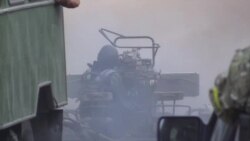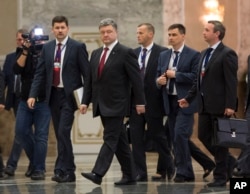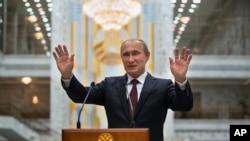Russian heavy weaponry has reportedly crossed the border into southern Ukraine, U.S. and Ukrainian officials said Wednesday, aiding rebels in what appeared to be a major counteroffensive in a new front along the border with Russia.
With battles raging to the north – near the rebel-held city of Luhansk, and southeast of the city of Donetsk — the fighting near Novoazovsk, a southern town along the Sea of Azov, appeared to be the most blatant incursion by Russian forces to date.
Western reporters around Novoazovsk said Ukrainian forces were abandoning vehicles and ammunition as they retreated from the advancing forces. The U.S. State Department said Russian military hardware crossing the border included tanks and rocket launchers and there were reports of separatists shelling residential areas in the port city of Mariupol, west of Novoazovsk. Heavy fighting had also erupted at the Donetsk airport.
Novoazovsk, a resort town of 40,000, is strategically located on the road linking Russia to Mariupol and, further west, the Black Sea peninsula of Crimea, which Russia annexed on March.
Ukrainian national security spokesman Col. Andriy Lysenko said a group of Russian soldiers had crossed the border in armored personnel carriers and a truck and entered the town of Amvrosiyivka, not far from where Ukraine detained 10 Russian soldiers on Monday.
Ukraine's lead security agency, the SBU, also said in a statement it had detained another Russian soldier in the east of the country who has confessed his unit provided military support to separatist rebels.
Lysenko said fighting in two other towns, Horlivka and Ilovaysk, had killed about 200 pro-Russian rebels and destroyed tanks and missile systems. At least 13 Ukrainian service personnel had been killed in the past 24 hours and 36 had been wounded.
Russia, which has not yet responded to the accusations, has repeatedly denied sending weapons and soldiers to help the rebels. Russian officials said the soldiers captured on Monday had crossed an unmarked section of the border by mistake.
“Russia continues to build up its military presence at their border,” Lysenko said. “During the last 24 hours, Russian military vehicles concentrated in border districts mostly in the Rostov region.”
The Associated Press reported its journalists on the border near Novoazovsk have seen rebels with a wide range of unmarked military equipment - including tanks, Buk missile launchers and armored personnel carriers - and have run into many Russians among the rebel fighters.
Military Buildup
Despite Moscow’s denials, Russian support for separatists since the rebellion began in April has been all but confirmed by eyewitness accounts, intelligence reports and types of weaponry being utilized in rebels’ fight against Ukrainian troops.
Western and Ukrainian officials have said Russia is trying to break Ukrainian forces’ siege of Luhansk, and also battling to open a supply corridor from border to nearby Donetsk.
The incursion occurred as Ukraine’s president met with his Russian counterpart, Vladimir Putin, for late-night talks in the Belarussian capital Minsk. The talks had appeared to yield some progress towards ending the conflict in which more than 2,200 people have been killed, according to the United Nations.
Ukrainian President Petro Poroshenko had said he would work on an urgent “road map” towards a ceasefire with the rebels. Putin said it would be for Ukrainians to work out ceasefire terms, but Moscow would "contribute to create a situation of trust".
In a press briefing following the Minsk meeting, Putin also called for renewed dialogue on outstanding trade issues, including the implementation of an agreement creating stronger ties between Ukraine and the European Union that Putin said poses a “significant risk” to the Russian economy.
Poroshenko’s predecessor, Viktor Yanukovych, had refused to sign the EU deal, sparking violent protests in Kyiv in February that eventually forced him from office, setting the scene for the present conflict. Poroshenko was elected president in May.
The United States, the European Union and other Western nations have imposed economic sanctions on Russia for its support of the separatists.
In a telephone call with Putin, Germany's Angela Merkel said reports of a new Russian military incursion into Ukrainian territory had to be cleared up, a spokesman for the chancellor said in a statement.
"The latest reports of the presence of Russian soldiers on Ukrainian territory must be explained," Merkel's spokesman Steffen Seibert said Wednesday. "She emphasized Russia's major responsibility for de-escalation and watching over its own frontiers."
NATO Military Exercises
Also Wednesday, NATO said it was stepping up exercises in Eastern Europe, as a way to assuage concerns of the alliance’s newer members – Latvia, Lithuania, Estonia, Poland, among others, who fear Russian threats. Alliance chief Anders Fogh Rasmussen said he expects NATO members next week will approve sending temporary forces into the region.
Psaki, the State Department spokeswoman, accused the Russian government of showing an "unwillingness to tell the truth even as its soldiers are found [30 miles] inside Ukraine.”
"Russia is sending its young men into Ukraine, but not telling them where they are going or their parents what they are doing,” she said.
Gas Warnings
Ukrainian Prime Minister Arseniy Yatsenyuk, meanwhile, warned that Russia could cut off gas to Europe this winter, a charge that Moscow quickly denied.
"The situation in [Ukraine's] energy sector is difficult. We know of Russia's plans to block [gas] transit even to European Union countries this winter, and that's why their [EU] companies were given an order to pump gas into storage in Europe as fully as possible," Yatsenyuk told a government meeting.
Russia has halted gas flows to Ukraine, a major transit route for EU gas, three times in the past decade in 2006, 2009 and since June this year because of price disputes with Kyiv.
In Moscow, Russian Energy Minister Alexander Novak called Yatsenyuk's comment a "groundless attempt to intentionally mislead or misinform European consumers of Russian gas.”
“We will put forth maximum efforts to fulfil gas contract obligations to European importers regardless of political issues in this or that transit country,” he said.
VOA's Mike Eckel in Washington and Gabe Joselow in Kyiv, Ukraine contributed to this report. Material from The Associated Press and Reuters was used in this report.















